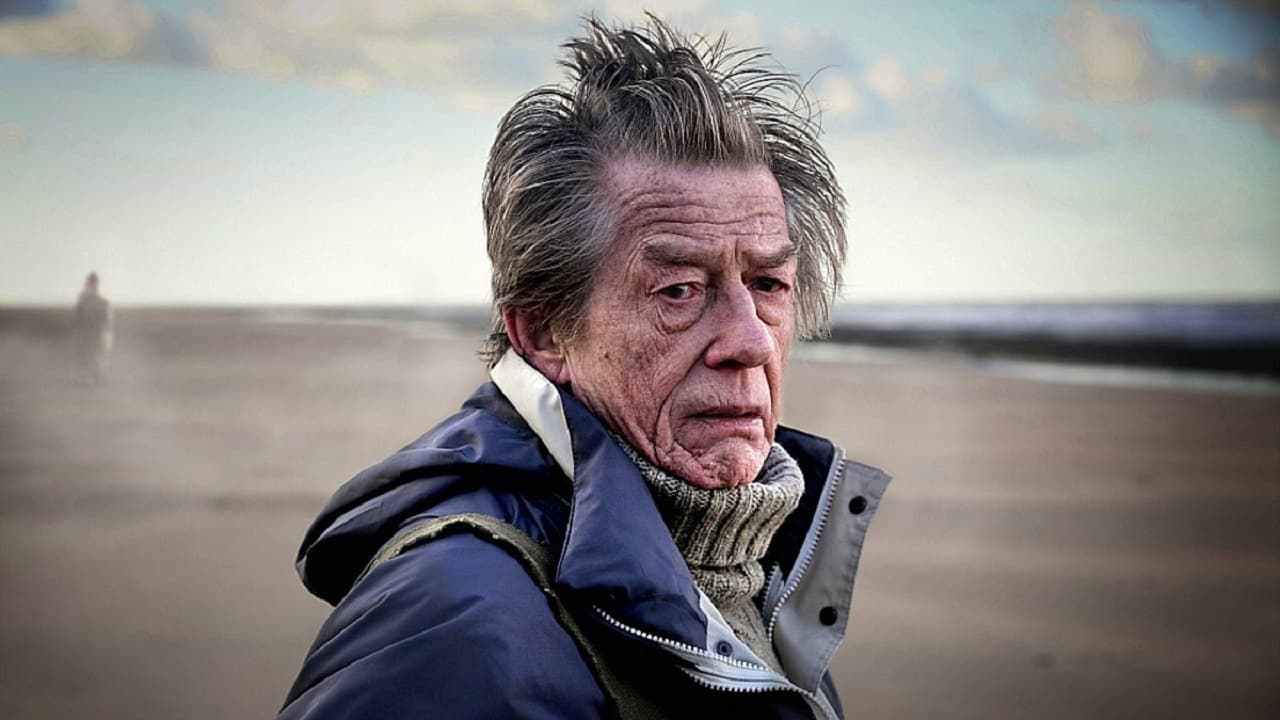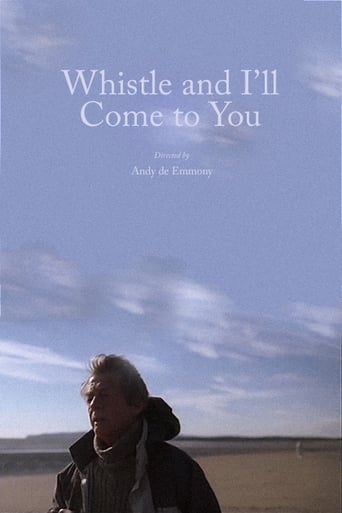TrueJoshNight
Truly Dreadful Film
PlatinumRead
Just so...so bad
Myron Clemons
A film of deceptively outspoken contemporary relevance, this is cinema at its most alert, alarming and alive.
Sarita Rafferty
There are moments that feel comical, some horrific, and some downright inspiring but the tonal shifts hardly matter as the end results come to a film that's perfect for this time.
Nigel P
In contrast to Sir Michael Hordern's character in the 1968 adaption of this classic tale, John Hurt's character (James Parkin) is far more socially adept. His wife, suffering from dementia, has been put into the hands of Lesley Sharp and her legion of nurses at a care home, and is revisiting a few 'old haunts' with the intention of taking a few photographs to bring back and show her. And yet, his conversation with lone receptionist Carol (Sophie Thompson), he – in fact both of them – address themselves as much as each other, both unknowingly trapped in their isolation.Rather than a whistle, it is a wedding ring he finds on the shore. The subsequent apparition he is followed by on the beach is surprisingly less of a special effect than in the original – a white, blurred mannequin.The hotel he stays in is typical of those hotels near the English coastline – magnificent yet weathered, sprawling but intimate. Out of season, Parkin is alarmed to find he is entirely alone during one fitful night. The porcelain bust of a head on a shelf in his room seems poised to move of its own accord – the camera teases as much, yet it remains static, much to our relief.Just as we never knew the nature of the spirit in the original, we are just as much deliberately left mostly in the dark here too – if indeed the spectres aren't figments of Parkin's very literal imagination. Here we can speculate that the very frightening scene at the end features the spirit of Parkin's wife blaming him for leaving her alone, or his own guilt. Either way, the effect and the lead-up to it, is genuinely unnerving.This 2010 version received mixed reviews. Some were incredulous, stating that Miller's early version didn't need a remake/reimagining, whilst others criticised the way the story was tweaked – so it seems Neil Cross's adaption could never win with some people. I love this version – it avoids repetition and does something new whilst retaining the original's atmosphere of dread.
john-morris-964-856483
I recently saw both versions of "Whistle and I'll come to you" for the first time and thoroughly enjoyed both but was somewhat surprised to come on here and see all the negative reviews for the remake. So this may help to redress the balance a little. Certainly, I am no fan of remakes. The vast majority are utterly pointless vanity projects and crucially, their major flaw is that they extract and dilute content, often removing a central motif, character or complexity found within the original work. Some of these criticisms have been levelled at the remake of "Whistle", however I feel this is unfair. I am no expert on MR James and I appreciate this prevents me from having a full picture of why people value this story so much. It seems that the themes of the original 1968 TV production are best summed up by muldwych in another review posted on IMDb: 1. "The heart of the story is the folly of arrogant presumption, that there will always be realms of understanding beyond mortal man, and to believe you can quantify existence is to invite downfall". 2. "The rapid destruction of Parkins's self-assured, almost autistic world is almost as disconcerting as the unknown forces he has unleashed". This take on the 1968 version is fascinating and there is no doubt that this is the central theme of the piece. However, with the wonderful Michael Hordern playing the role, I just don't get the sense of his world crumbling in this way. He seems intrigued by these "unknown forces" but never particularly troubled by them (with the exception of the last 30 seconds). In a scene five minutes before the end, he is still fussing about not liking tomatoes and generally bumbling around in his own world. The events hardly seem to depict the dismantling and discrediting of an intellectual mindset as other reviews have described.So what is it about the John Hurt version that irritates fans of the original adaptation? Well, it is indeed a very different character with different circumstances. Hurt has just taken his incapacitated wife, suffering from dementia, into a care home and then gone on a therapeutic holiday alone to revisit places where they spent time together. While this twist raises the ire of many fans of the original tale, for me on first viewing without any background knowledge, it was utterly compelling and sublime. There is a palpable sense of loss, loneliness and bereavement running throughout, as Hurt appears to be pushing himself into this new life of solitude, forcing himself to function and revisit the past, a place that is both comforting and gut wrenchingly bittersweet. The film just seems to throb and reverberate with a glow of sadness and a kind of bleak fortitude.And this is perhaps where the two adaptations link together. Both men have been cut loose from their moorings and their belief systems, and the way they understand and relate to the world around them is being called into question. Michael Hordern's version of the character is not put into this situation until he blows into the whistle. John Hurt is already adrift when he arrives at the hotel and the supernatural events send him further into this spiral. But they are both lost souls in different ways and for this reason, they are both equally valid as a lead character.The two versions are exquisitely filmed and both are utterly beautiful. I did find more tension in the 2010 remake, I have to say, and I found myself nervously scouring the edges and background of each frame for any ghostly figures or disturbing detail. So for this reason, maybe the John Hurt version just edges it for me. Admittedly though, perhaps the title of the remake should've been changed, as it is a little clumsy considering the plot changes involved.
AlanJ2
This is a modern version of the classic MR James ghost story 'Whistle and I'll Come To You'. To his credit Neil Cross has tried to find a modern way into the story and has turned it into a tale about a man whose wife is lost to Alzheimer's. Unfortunately what emerges has little resonance (the Alzheimer's stuff is patently phony--sorry Neil all sufferers from the illness do not act like corpses)and also zero connection to the original. All that survives is a lonely hotel by the seaside, a lonely man and...well not much else. Not even the whistle remains. The writer might just as well have stopped trading on the classic name and author and done an original story . Except of course if he had it would never have been made. Nobody is saying we need a slavish copy. Jonathan Miller's earlier classic version was recognisably the same story but it was still changed to brilliant effect. Cross just grafts a mediocre ending on and leaves it at that. The result is quite atmospherically directed but all else goes for nothing. What exactly was the point?
jc-osms
It's many years since I read the M.R. James ghost story from which this production was adapted and so my familiarity with it has faded. I could only approach it then on its own merits whilst obviously recognising that the story had been relocated to the present-day. As such, whilst I did get caught up, to some extent, in the events which overtake John Hurt, who having just put his senile dementia-suffering wife into a care home, revisits, as he himself puts it, an old haunt of theirs, the story just had too many ambiguities to really leave me anything more than puzzled by the end.I found myself trying too hard to put together the relative significance of the various constituents of the plot devices employed, like the ring Hurt finds on the beach, the vaguely menacing statuette which sits in his boarding house room and the appearance of the apparition on the beach. No doubt the director's aim was to make manifest the inner turmoil of Hurt's character, haunted by the guilt of abandoning his wife's care to others and his own inner wish to be reunited with her, but I wasn't fully convinced that such a sane-seeming individual as Hurt would succumb to his demons as actually takes place.That said, the climactic scene itself did bring up the hackles on my neck, with it's effective use of close editing and background music, but for me, I couldn't afterwards tie up the loose ends as I felt I should.It's also been a while since I saw John Hurt in a TV role and nowadays his lived-in face is perfect for an anguished role like this. The rest of the cast is minimal in number, pointing up his isolation. The unnatural eeriness of him walking a deserted beach in broad day-light and being completely alone in the boarding house seems a little unnatural however and stretches credulity. The direction too is a little slow and grey and fails to convey Hurt's dread until the very end.A production then which for me lost something in the updating, and couldn't withstand the superimposition of modern-day post-traumatic psychology onto the source material of a hoary old Victorian ghost-story.

